环球时报英文版评《大国的幻象》:中国需打破西方思维霸权
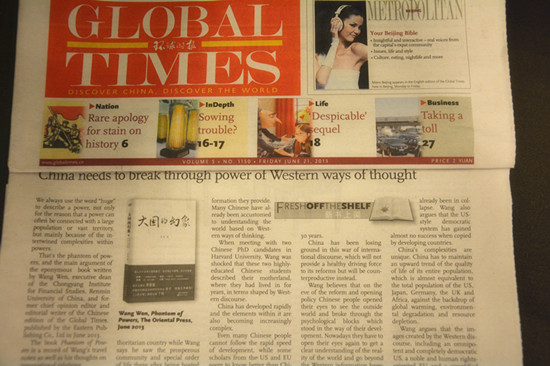
《环球时报》英文版6月21日发表题为《中国需打破西方思维霸权》的文章
人大重阳网消息:《环球时报》英文版6月21日发表题为《中国需打破西方思维霸权》的文章。文章提到,“中国目前发展迅速,国家的内部问题也变得愈发复杂。连很多中国人自己都难以紧跟中国快速的发展步伐,而一些美国和欧盟的学者也似乎自认为比中国人自己更了解中国。但是,基于对现实情况了解甚微,且缺乏亲身经历,使得欧美学者当中的大部分人对于中国自改革开放近三十多年以来所面临的种种困境难以感同身受,也难以对中国的崛起怀有敬佩之意。中国长期在国际话语权的争夺战中处于劣势,这不会为自身改革带来有效的推动力,反而是阻力。”
以下英文报道全文:
China needs to break through power of Western ways of thought
We always use the word “huge” to describe a power, not only for the reason that a power can often be connected with a large population or vast territory, but mainly because of the intertwined complexities within powers.
That’s the phantom of powers, and the main argument of the eponymous book written by Wang Wen, executive dean of the Chongyang Institute for Financial Studies , Renmin University of China, and former chief opinion editor and editorial writer of the Chinese edition of the Global Times, published by the Eastern Publishing Co,. Ltd in June 2013.
The book Phantom of Powers is a record of Wang’s travel notes as well as his thoughts in international relations.
From what he had seen and heard in countries including the US, EU member states, Iran, Japan and South Korea, he found that there’s a gap between reality and Chinese people’s understandings.
For instance, Iran is always deemed as a turbulent and authoritarian country while Wang says he saw the prosperous community and special order of life there after being hosted by the government on a trip.
Wang contributes this gap to the inequality in international discourse between the East and the West.
The world is surrounded, and even blinded by the soft power of Western countries, the Western media and the information they provide. Many Chinese have already been accustomed to understanding the world based on Western ways of thinking.
When meeting with two Chinese PhD candidates in Harvard University, Wang was shocked that these two highly-educated Chinese students described their motherland, where they had lived in for years, in terms shaped by Western discourse.
China has developed rapidly and the elements within it are also becoming increasingly complex.
Even many Chinese people cannot follow the rapid speed of development, while some scholars from the US and EU seem to know better than Chinese people ourselves.
However, due to lack of knowledge of the facts and personal experience, most of them have do not have enough basic compassion and respect of the difficulties and plight that China’s reform and opening-up has faced in the last more than 30 years.
China has been losing ground in this war of international discourse, which will not provide a healthy driving force to its reform but will be counterproductive instead.
Wang believes that on the eve of the reform and opening policy Chinese people opened their eyes to see the outside world and broke through the psychological blocks which stood in the way of their development. Nowadays they have to open their eyes again to get a clear understanding of the reality of the world and go beyond the Western information hegemony.
Actually, China does not need to follow the Western mode of thinking and repeat the ways that developed countries have already used, Wang holds. After the 2008 financial crisis, the dominant position of the Western countries has already been in collapse. Wang also argues that US-style democratic system has gained almost no success when copied by developing countries.
China’s complexities are unique. China has to maintain an upward trend of the quality of life of its entire population, which is almost equivalent to the total population of the US, Japan, Germany, UK and Africa, against the backdrop of global warming, environmental degradation and resource depletion.
Wang argues that the images created by the Western discourse, including an omnipotent and completely democratic US, a noble and human rights-oriented EU and a simplified and threatening China, lead to the phantom of powers which distorts the reality. A real improvement in Chinese thinking is necessary to break through it.
中文翻译如下:
中国需要打破西方的思维霸权
我们经常使用“巨大”这个字眼来描述大国,之所以这样做不仅仅是因为它可以用来描述大国庞大的人口数量或是宽广的领土面积,主要还在于大国之间的错综复杂性。
2013年6月,王文——中国人民大学重阳金融研究院执行副院长、前《环球时报》社评主要起草人,于东方出版社出版《大国的幻象》一书。
该书记录了王文的游历多国的心得及其对大国关系的思考。
在美国、欧盟国家、伊朗、日本和韩国的所见所闻使王文发现中国人对许多世界大国的看法并不完全符合其真实情况。
比如,伊朗一直被认为是充满动乱的独裁国家。然而,在一次官方主办的活动中,王文却看到了社会繁荣发展,人们生活井井有条的别样伊朗。
王文认为,这些错解源于东西方之间不平等的国际话语权所致。
当今世界被西方国家的“软实力”和其媒体言论所笼罩,甚至蒙蔽。很多中国人已习惯用西方的思维来理解世界。
王文在和两位哈佛大学的中国博士生聊天时发现,这两位拥有高等教育的中国留学生竟然也以西方人的口吻去评价久居的祖国,对此,王文不禁瞠目结舌。
中国目前发展迅速,国家的内部问题也变得愈发复杂。
连很多中国人自己都难以紧跟中国快速的发展步伐,而一些美国和欧盟的学者也似乎自认为比中国人自己更了解中国。但是,基于对现实情况了解甚微,且缺乏亲身经历,使得欧美学者当中的大部分人对于中国自改革开放近三十多年以来所面临的种种困境难以感同身受,也难以对中国的崛起怀有敬佩之意。
中国长期在国际话语权的争夺战中处于劣势,这不会为自身改革带来有效的推动力,反而是阻力。
王文指出,改革开放前的中国人呼吁“睁开眼睛看世界”,是为了突破自我心理封锁,而现在,中国人再次“睁开眼睛看世界”是为了清晰地了解世界现实,超越西方信息霸权对世界的蒙蔽。
王文认为,其实中国根本不用紧随西方人的思维模式,重复发达国家的发展道路。2008年金融危机之后,西方国家的主导地位已经日益下滑。同时王文也指出,那些模仿美国式民主体系的发展中国家几乎难以获得成功。
中国的发展也面临着特殊性和复杂性。在全球变暖、环境恶化、资源枯竭的大背景下,中国政府要使人们的生活质量处于上升的趋势。然而,中国的人口数量却几乎等同于美国、日本、德国、英国以及非洲的人口总和。
王文认为,西方的话语霸权导致了种种“扭曲现实的大国幻象”。他们眼中的美国——万能、完全民主;欧洲——神圣、倡导人权;中国——简单、具有威胁。因此,中国要想在思维上得到真正的提升就非常有必要打破西方的思维霸权,发出自己的声音,传播自己的理念。
《大国的幻象》新书发布会现场
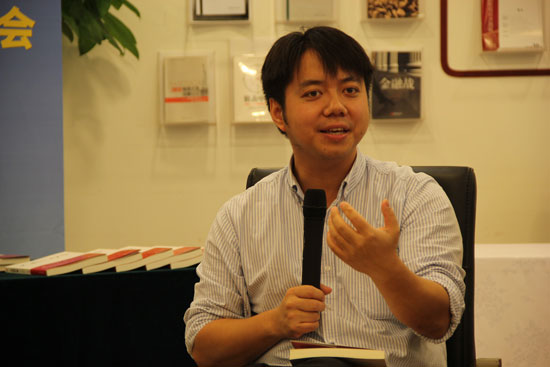
中国人民大学重阳金融研究院执行副院长 王文
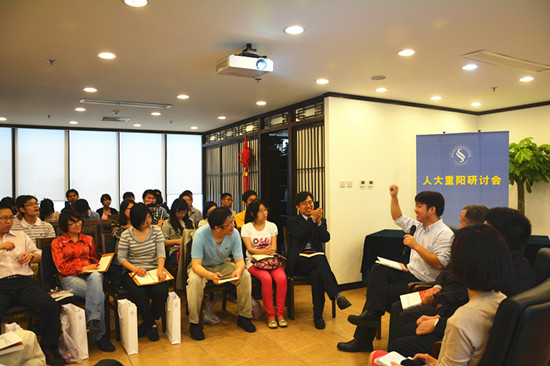
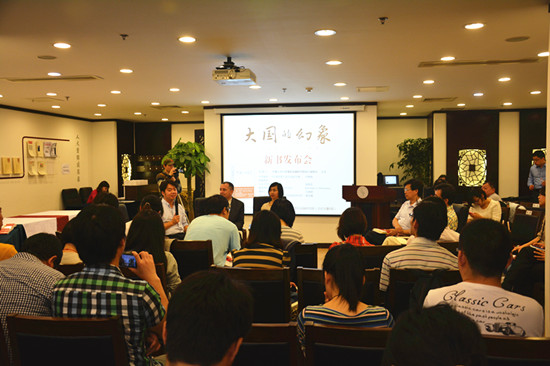
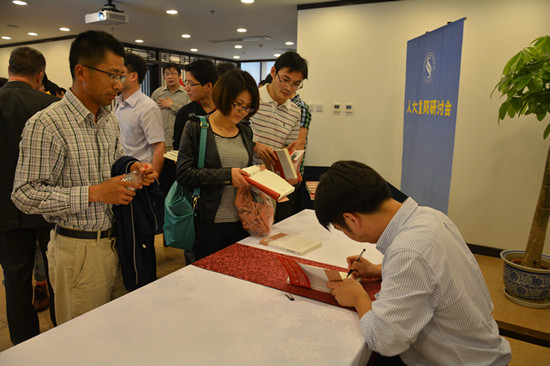
发布会现场